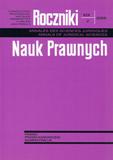Status prawny członka rodziny obywatela Unii Europejskiej
Legal Status of a Family Member of an EU Citizen
Author(s): Jolanta BucińskaSubject(s): Essay|Book Review |Scientific Life
Published by: Towarzystwo Naukowe KUL & Katolicki Uniwersytet Lubelski Jana Pawła II
Keywords: family reunion principle; right to residence; freedom of personal movement; zasada łączenia rodzin; prawo pobytu; swoboda przepływu osób
Summary/Abstract: The article analyses those acts of the EU acquis that determine the legal status of a migrating EU citizen’s family members. It is noteworthy that the definition of a family member includes not only spouses and dependent children but also partners in a registered relationship (provided that the domestic law of a given EU country provides for such relationships) and parents. Furthermore, owing to the principle of family reunion, entry is made easier for those persons who are not covered by the legal definition of a family member but are otherwise connected with the migrating person. In its judicature, the Court of Justice of the European Communities permits a broad interpretation of the scope of subjects who are entitled to enjoy the status of a family member. An analysis of the judicature to date and provisions of the EU secondary legislation indicates that the possibility to enjoy the right to residence as a family member depends on the EU migrating citizen’s acquisition of the necessary status as an entitled subject. The scope of entitlement of family members does not depend on the social background but is conditional upon the kind of status of the EU citizen. Occasionally the acquis distinguishes between the rights of working persons and those seeking employment and, on the other hand, the rights deriving from the right to residence. Moreover, premises upon which the right to residence and movement can be granted vary according to a person’s background. All regulations pertaining to the freedom of personal movement should be interpreted in the spirit of family reunification, which results in a ban on automatic expulsion if no formal conditions are met. The right to rejoin one’s family as well as freedom of movement itself are not absolute rights and are subject to restrictions, which are justified if the receiving state deems it necessary to protect its public order, safety or health. Another restriction holds if a person is employed in a public administration agency.
Journal: Roczniki Nauk Prawnych
- Issue Year: 19/2009
- Issue No: 2
- Page Range: 57-74
- Page Count: 18
- Language: Persian

